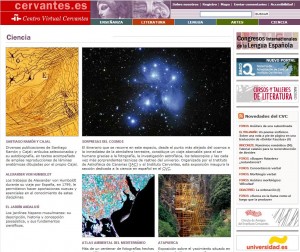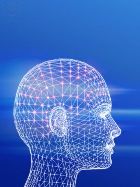Blog del Instituto Cervantes de Dublín
Torre Martello
El español, una lengua para la ciencia / Spanish, a language for science
 Hubo una vez un señor en León que tenía los ojos azules y la piel oscura, muy oscura, aunque no sabemos exactamente hasta que punto. Un señor que vivió hace aproximadamente 7000 años. Era un cazador recolector del mesolítico que no llegó a conocer la revolución agrícola que 3000 años antes había comenzado en el Próximo Oriente.
Hubo una vez un señor en León que tenía los ojos azules y la piel oscura, muy oscura, aunque no sabemos exactamente hasta que punto. Un señor que vivió hace aproximadamente 7000 años. Era un cazador recolector del mesolítico que no llegó a conocer la revolución agrícola que 3000 años antes había comenzado en el Próximo Oriente.
Los restos de este señor de León, con parientes en el norte de Europa (Suecia y Finlandia) y, antes aún, en Siberia, descansaban en una cueva en las montañas, a unos 1500 metros sobre el nivel del mar, hasta que fueron descubiertos en 2006.
El CSIC, (Consejo Superior de Investigaciones Científicas), la mayor institución pública dedicada a la investigación en España y la tercera de Europa, publicó la semana pasada los resultados del estudio de su genoma, el más antiguo de la Prehistoria recuperado.
Y es que España es, desde hace años, una fuente de información de incalculable valor para todos los que estudian los orígenes de la humanidad. Una investigación que abarca «las transformaciones físicas, mentales y sociales que hemos experimentado a lo largo del tiempo y que nos han hecho como somos».
Precisamente, no muy lejos de las montañas en las que fue localizado este señor de León, se encuentra la Sima de los Huesos de Atapuerca, donde un equipo de científicos investiga desde el año 1976 restos humanos de hasta 900000 años de antigüedad y donde se ha podido obtener ADN mitocondrial de hace 400000 años. Apasionante, ¿no te parece? Pues si quieres saber más, aquí hay algunos enlaces que te van a interesar. Eso sí, algunos de ellos solo tienen versión en español.
- Ciencia en el Centro Virtual Cervantes.
- Libros electrónicos gratuitos del CSIC.
- Página web CSIC.
- Fundación Atapuerca.
- Página web Atapuerca TV.
Once upon a time, there was a man with blue eyes and dark skin who lived in the mountains of León, in northwest Spain. This man lived about 7000 years ago. He was a Mesolithic hunter-gatherer who never knew the agricultural revolution that began 10000 years ago in the Middle East.
The remains of this man of León, with relatives in northern Europe (Sweden and Finland), and even in Siberia, were discovered in a cold cave, at 1500 metres above sea level, in 2006.
CSIC (Spanish National Research Council), the largest public institution dedicated to research in Spain and the third largest in Europe, published last week the results from an analysis of DNA taken from the wisdom tooth of this man.
Spain has been for years a source of invaluable information for all who study the origins of mankind. Research that covers “the physical, mental, and social transformations experienced by our ancestors through time and that have made us what we are today.”
Indeed, Atapuerca is not far from the mountains in which the blue-eyed man from León was located. In Atapuerca, a team of scientists investigates, since 1976, human remains up to 900,000 year old. In fact, in December 2013, researchers determined an almost complete mitochondrial genome sequence of 400,000-year-old representative of the genus Homo from Sima de los Huesos. Exciting , isn’t it ?
Well, if you want to know more, here you are some useful links. And yes, some of them are only in Spanish version.
Coloquio: Café-teatro científico en torno al cerebro | Discussion: Science café about the Brain
 Coincidiendo con la Semana de la Ciencia 2012, el Instituto Cervantes te trae una charla divulgativa en formato de café-teatro, que puedes disfrutar hoy a las 18:00 horas en el Café Literario. No olvides hacer tu reserva en reservas.dublin@cervantes.es
Coincidiendo con la Semana de la Ciencia 2012, el Instituto Cervantes te trae una charla divulgativa en formato de café-teatro, que puedes disfrutar hoy a las 18:00 horas en el Café Literario. No olvides hacer tu reserva en reservas.dublin@cervantes.es
¿Qué provoca las ilusiones visuales? ¿Por qué sufrimos pérdida de memoria? ¿Qué función tienen las neuronas? Si sientes un gran interés por el funcionamiento de nuestra mente y te gustaría aprender cosas en un tono desenfadado pero riguroso, no dejes pasar la oportunidad y asiste a esta charla llevada a cabo por un científico (Casto Rivadulla) y un actor (Vicente de Souza).
Disfruta de una bebida gratuita mientras asistes a la actividad.
During Science Week 2012, Instituto Cervantes brings you an informal and informative talk. You can enjoy it today at 6pm at Cafe Literario. Don´t forget make your reservation in reservas.dublin@cervantes.es
What creates visual illusions? Why do we suffer from memory loss? What is the function of neurons? If you are interested on how our mind works and you would like to learn more about it in an informal but accurate fashion, don’t miss this opportunity and come along to this talk hosted by a scientist and an actor.
Have a free drink while enjoying our science café.



